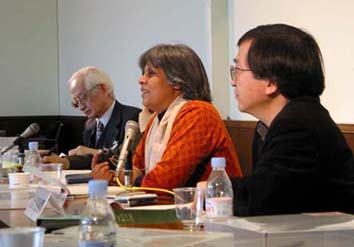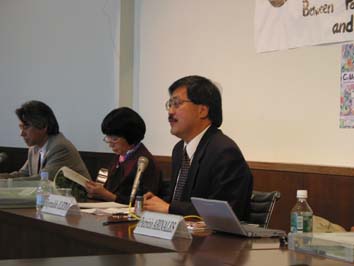The end of the Cold War has transformed the older political, economic and social settings which used to be constructed under the two superpowers' rivalry. Along with this change came a process of liberalization, democratization and globalization in Asia, as elsewhere in the world, in 1980s and '90s. It was good to bid farewell to military dictatorship or state-controlled economy, but it also meant giving up the once ambitious human endeavor to realize a new society through state power and rational plans. At the same time, national autonomy, to whatever extent, gives away to the hegemony of the United States and the global market.
In the academic discourse, too, new tendencies have grown influential during these two decades. One is the postmodern critique which situates the bias of the modern, especially post-enlightenment, intellectual framework as western-centric, capitalistic, imperialistic, and patriarchical. The other consists of various types of right-wing nationalism or religious fundamentalism which cause tensions in many societies. Interestingly, both tendencies have aggressively confronted with the well-established disciplines of historical studies. Postmodernists question the historian as a 'subject' who easily gives reasonable interpretation; while ultra-nationalists and religious extremists attack the 'objectivity' of positivistic data-analysis based on historical materials.
To a greater or lesser extent, all post-WWII and postcolonial societies in Asia share this kind of situation. Today a historian should fight on two fronts: to prove that one's own concepts and methods are still relevant in the age of postmodernism, and to take risk of being accused to be anti-national/anti-religious. We have invited three such brave and brilliant scholars to this workshop. Dr. Tanika Sarkar, Dr. Reynaldo Ileto and Dr. Daqing Yang will talk on historiography in India, the Philippines, Japan and China. Through provocative presentations and discussion from a comparative perspective, we believe that this meeting will offer a unique opportunity for all participants to rethink the dilemma and possibility of historical studies: 'Can we write history?'
Program
9.30-10.00
Keynote Speech
Kei Takeuchi
(Meiji Gakuin University)
10.00-12.00
Session 1 "On Indian Historiography"
Chair Takao Takahara
(Meiji Gakuin University)
Speaker Tanika Sarkar
(Jawaharlal Nehru University)
Discussant Nariaki Nakazato
(The University of Tokyo)
Discussant Chiharu Takenaka
(Meiji Gakuin University)
12.00-13.00
Lunch
|
 |
 |
13.00-15.00
Session 2 "On Historiography in the
Philippines"
Chair Akira Oki
(Meiji Gakuin University)
Speaker Reynaldo Ileto
(National University of Singapore)
Discussant Yoshiko Nagano
(Kanagawa University)
Discussant Patricio Abinales
(Kyoto University)
15.00-15.30
Coffee and Tea
|
15.30-17.30
Session 3 "On Historiography in Japan and China"
Chair Michael Watson
(Meiji Gakuin University)
Speaker Daqing Yang
(George Washington University)
Discussant Hatsue Shinohara
(Meiji Gakuin University)
Discussan Kiichi Fujiwara
(The University of Tokyo)
|
 |
the Academic Frontier Project, Institute for International Studies, Meiji Gakuin University
Tel. 045-863-2267 Fax. 045-863-2272 E-mail:frontier@k.meijigakuin.ac.jp



